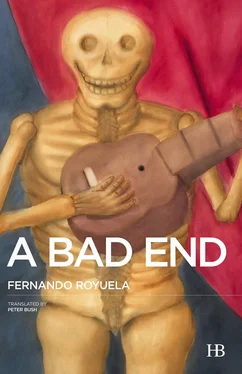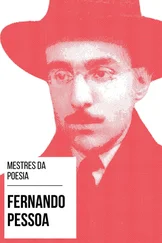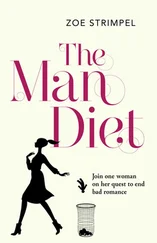Fernando Royuela - A Bad End
Здесь есть возможность читать онлайн «Fernando Royuela - A Bad End» весь текст электронной книги совершенно бесплатно (целиком полную версию без сокращений). В некоторых случаях можно слушать аудио, скачать через торрент в формате fb2 и присутствует краткое содержание. Год выпуска: 2016, Издательство: Hispabooks, Жанр: Современная проза, на английском языке. Описание произведения, (предисловие) а так же отзывы посетителей доступны на портале библиотеки ЛибКат.
- Название:A Bad End
- Автор:
- Издательство:Hispabooks
- Жанр:
- Год:2016
- ISBN:нет данных
- Рейтинг книги:3 / 5. Голосов: 1
-
Избранное:Добавить в избранное
- Отзывы:
-
Ваша оценка:
- 60
- 1
- 2
- 3
- 4
- 5
A Bad End: краткое содержание, описание и аннотация
Предлагаем к чтению аннотацию, описание, краткое содержание или предисловие (зависит от того, что написал сам автор книги «A Bad End»). Если вы не нашли необходимую информацию о книге — напишите в комментариях, мы постараемся отыскать её.
A Bad End — читать онлайн бесплатно полную книгу (весь текст) целиком
Ниже представлен текст книги, разбитый по страницам. Система сохранения места последней прочитанной страницы, позволяет с удобством читать онлайн бесплатно книгу «A Bad End», без необходимости каждый раз заново искать на чём Вы остановились. Поставьте закладку, и сможете в любой момент перейти на страницу, на которой закончили чтение.
Интервал:
Закладка:
The day after I was sold, the Stéfano circus upped the stakes on their show of dreams and forever abandoned the village where I was born. I left behind a truncated childhood spoilt by beatings, knocks, and emotional disorders that brought a variety of aftermaths. I left behind unhappy times, full of dubious illusions and sickly fantasies where I’d learned to wallow in the clandestine kind of life granted by the knowledge I was different, immune to insults, with head held high beneath a crown of sorrow. Stuck in the caravan Gurruchaga was steering, amid a heap of motley items, I peered out of a type of porthole that opened wide to the world and saw the glittering lights of El Paquito’s receding into the distance. It was early morning, and dawn was exploding with flights of swooping swifts. The caravan smelled of muck, but a different, smellier muck, if that’s possible, not as strong, but more tangible — more real, like the new life awaiting me.
The Stefáno circus was a startling place. Everything made this country yokel gasp and brought slaver bubbling to my lips — the dense aromas in the big top, the spectacular sight of bears, lions, and tigers, the fetid charms of their roars, the junk in the covered wagons, the pervasive sense of the provisional; everything was new and surprising, and yet something malign lurked in that hotchpotch. A circus is truly a sanctuary of the grotesque. The oddest things you can imagine can happen at any moment — a bouquet of flowers, clumsy high-wiring leading to death, a crime of passion, a loud guffaw that becomes a premonition of disaster. A circus is the realm of the impossible, the home of ambiguity, and the last frontier of reason.
The grotesque triggers people’s belly laughter and relaxes their guts. Depending on how and when, deformity sometimes comes up trumps. The public took its time finding me funny but finally did, you bet it did, my survival hung on their laughs. I soon began to miss the cutting wind that brought me round of a morning in the village and the monotonous pace at which things happened without variation, like the little figures appearing on those mechanical clocks the exact moment the hour is struck. The circus offered another view of reality, one that wasn’t more agreeable or less tragic, another dimension of existence hard to understand from the outside. The circus was a grazing ground for monsters, a field fertilized for the nurture of eccentricities I would soon have to harvest. There I learnt to distinguish the pettiness of bodies from the goodness of souls, and the pettiness of souls from the goodness of bodies, there I suffered life’s derision in my own flesh and experienced the intense satisfaction that comes with the knowledge that one is not yet dead; it was there I became a man.
Gurru, the shit man, was Chinese, or Basque, or from nowhere in particular. People’s manners are generally decided by the social cream in the milk they suckled. This hit you between the eyes in the circus. Gurruchaga’s mission in life was to muck out the animal cages and get food for the inmates. A demanding task in times of shortages like those it was our bad luck to experience. He was equipped with a spade for digging ditches, except that rather than sticking it into the rock-hard soil of Spain, he stuck it into the soft fecal matter in the cages.
Pudgy Di Battista diluted his cognac with Carabaña mineral water. A few drops of water in all that alcohol did little to help his blood pressure, but he kept pouring them in, perhaps to be at one with his conscience. It was quite usual to watch him giving out orders that got confused as he slurred, and the result was an unintelligible juggling act one needed patience to unravel: “Vedi thatta fella dil capello colore shit? Youlla aiutarle cun ze cleanin’ di cages,” and thus he assigned me to the charge of Gurruchaga.
Elephants spread their legs before peeing, raise their trunks, relax their bladders, and release a cascade of urine on the ground as if a thick spurt of amber were streaming from the well of their insides. Pudgy Di Battista gave me over to that prickly individual whose face glistened with the grease of defeat. He wasn’t at all amused by this ward Di Battista had foisted upon him, and he welcomed me churlishly. His first decision was to take me to the elephants and shove me in among them. “Give them a drink,” he growled, “there’s a bucket.” Terrified they might trample me to pulp, I filled it with water and put it within reach of one. An elephant, whose truncated tusks had degenerated into worm-eaten stumps, grunted as it stretched out its trunk and put the end in the bucket. It halfheartedly sipped, savored the water in its mouth, then spat it out at top speed into my face, complete with thick globules of snot like the swollen bodies of lampreys. Gurru erupted into a hiccupping laugh he almost choked on. “Look, kid,” he recriminated, “you must give elephants water before they start digesting, or else it gives them stomachache and they puke up. You’ve got a lot to learn, and the first thing to do is to learn to look after yourself among so many animals. If you do whatever you’re told to without giving it a bit of thought yourself, you’ll have a rough ride around here.”
What most impressed me about that first conversation was that he called me “kid,” rather than dwarf, crud, cripple , or something equally nice.
Gurruchaga could guess an animal’s ailments by the smell of its droppings. “Look, kid, the tiger has got a chesty cough, can’t you smell his shit’s a bit moldy?” The organoleptic qualities of excrement are vital when it comes to diagnosing diseases. He crouched over their deposits as if he were testing the sound of the planet’s gravitational pull, and when he was right over them, he flared his nostrils, took a deep breath until he filled his lungs with the stink. Then he clicked his tongue and announced his diagnosis. “This monkey’s in heat big time; we must sort that.” The smell and even the taste of excrement were, as far as he was concerned, an infinite source of information; where experience couldn’t take him, the tip of his nose did.
When it was belt-tightening time, Gurru fed the animals on their own fecal matter, which he camouflaged with chunks of stray animals that Providence was good enough to send our way: dogs, rats, cats, or sheep cast from their flock, which we’d occasionally bump into and were a wonderful find in that sense. It cost a fortune to feed the circus animals, and Di Battista’s resources were always minimal, so Gurruchaga went to all kinds of lengths to find them victuals. Dog was what there was mostly. Carnivores are keen on canine flesh, and it’s easy to find. We’d have to be very unlucky not to come across a stray dog on the road and be able to stun it to death with a surprise blow to the head. Gurruchaga was in charge of the operation, and I helped him as much as my natural clumsiness allowed. Any sacrifice was better than letting our animals starve. Di Battista would never have forgiven that and would have betrayed him to the military courts. Gurruchaga knew as much; he had a past to hide. “Hey, Goyito, try this — this elephant’s got cirrhosis of the liver, his shit tastes of ethane,” and the elephant took note and died after a week of protracted agony, the moans you could hear all over the circus finally did everyone’s mind in.
Despite the privations and the penury, the Stéfano circus was a happy processionary caterpillar, roaming Spain in pursuit of the good weather factor. In summer we penetrated northern backwaters, in autumn we did the southeast coast, in winter we visited the villages and towns of Extremadura and Andalusia, and in springtime we flowered on the Meseta. I always traveled with Gurruchaga, stuck in his caravan next to the pile of junk that made up his baggage in life. I helped him clean the cages, see to the hygiene of the animals, and procure their fodder. I gradually adapted to the work. I thought anything was better than having to appear in the ring and keep the spectators happy. I took great care of the cages and washed out all the excrement, so they shone spick and span like newly polished altars. I was a diligent worker, and nobody bothered me. Gurruchaga watched me handle the spade in amazement. I didn’t do at all badly considering I was a dwarf, I put my heart into it, my heart and my sweat. Initially I was afraid of the animals and waited for them to enter the ring before seriously tackling their cages, but they immediately got used to my presence, and I worked in them and they didn’t bat an eyelid except when they were sick and undernourished. “Whistle the Spanish national anthem for that tiger or it’ll stick a paw into you,” Gurru advised if he saw me in any danger, and I whistled away as cocksure as anything. Gurruchaga was a prickly character who hardly spoke to anyone. On the other hand, he began to take a shine to me. In honor of his nickname, he spent the whole day up to his neck in muck, and flies buzzed around his temples even when he was cooking. “Shit is life, kid. In the war, I shit my pants the first time I went into battle, and it saved my skin,” he confessed one night after a relaxing cup of coffee. “We were in Belchite, and Franco held a hilltop vantage point. When the people in my brigade whiffed what my panic had produced, they ran away from me, and their reward was to get shot to pieces by the Fascists when they saw them move. I stayed still and was fine. That saved me. The rest was pure butchery. Their machine-gun nests rat-a-tatted death for a couple of hours. Our tanks couldn’t find a way through, and we lost the position. The battalion was wasted, but I saved my skin thanks to that shit. Just remember this, and never scorn even the most disgusting filth. Shit is life; it saved mine.”
Читать дальшеИнтервал:
Закладка:
Похожие книги на «A Bad End»
Представляем Вашему вниманию похожие книги на «A Bad End» списком для выбора. Мы отобрали схожую по названию и смыслу литературу в надежде предоставить читателям больше вариантов отыскать новые, интересные, ещё непрочитанные произведения.
Обсуждение, отзывы о книге «A Bad End» и просто собственные мнения читателей. Оставьте ваши комментарии, напишите, что Вы думаете о произведении, его смысле или главных героях. Укажите что конкретно понравилось, а что нет, и почему Вы так считаете.












